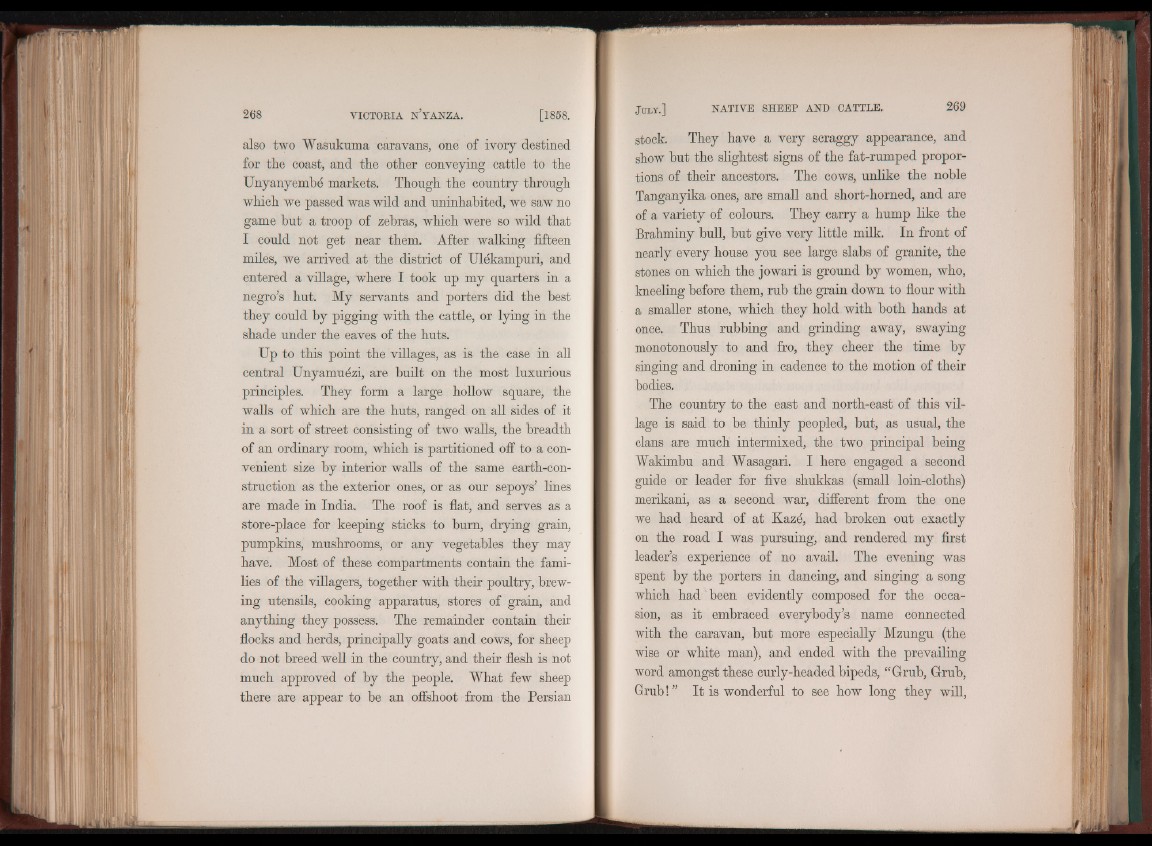
also two Wasukuma caravans, one of ivory destined
for the coast, and the other conveying cattle to the
Unyanyembd markets. Though the country through
which we passed was wild and uninhabited, we saw no
game but a troop of zebras, which were so wild that
I could not get near them. After walking fifteen
miles, we arrived at the district of Ulekampuri, and
entered a village, where I took up my quarters in a
negro’s hut. My servants and porters did the best
they could by pigging with the cattle, or lying in the
shade under the eaves of the huts.
Up to this point the villages, as is the case in all
central Unyamuezi, are built on the most luxurious
principles. They form a large hollow square, the
walls of which are the huts, ranged on all sides of it
in a sort of street consisting of two walls, the breadth
of an ordinary room, which is partitioned off to a convenient
size by interior walls of the same earth-con-
struction as the exterior ones, or as our sepoys’ lines
are made in India. The roof is flat, and serves as a
store-place for keeping sticks to bum, drying grain,
pumpkins, mushrooms, or any vegetables they may
have. Most of these compartments contain the families
of the villagers, together with their poultry, brewing
utensils, cooking apparatus, stores of grain, and
anything they possess. The remainder contain their
flocks and herds, principally goats and cows, for sheep
do not breed well in the country, and their flesh is not
much approved of by the people. What few sheep
there are appear to be an offshoot from the Persian
stock. They have a very scraggy appearance, and
show but the slightest signs of the fat-rumped proportions
of their ancestors. The cows, unlike the noble
Tanganyika ones, are small and short-horned, and are
of a variety of colours. They carry a hump like the
Brahminy bull, but give very little milk. In front of
nearly every house you see large slabs of granite, the
stones on which the jowari is ground by women, who,
kneeling before them, rub the grain down to flour with
a smaller stone, which they hold with both hands at
once. Thus rubbing and grinding away, swaying
monotonously to and fro, they cheer the time by
singing and droning in cadence to the motion of their
bodies.
The country to the east and north-east of this village
is said to be thinly peopled, but, as usual, the
clans are much intermixed, the two principal being
Wakimbu and Wasagari. I here engaged a second
guide or leader for five shukkas (small loin-cloths)
merikani, as a second war, different from the one
we had heard of at Kaze, had broken out exactly
on the road I was pursuing, and rendered my first
leader’s experience of no avail. The evening was
spent by the porters in dancing, and singing a song
which had been evidently composed for the occasion,
as it embraced everybody’s name connected
with the caravan, but more especially Mzungu (the
wise or white man), and ended with the prevailing
word amongst these curly-headed bipeds, “Grub, Grub,
Grub! ” I t is wonderful to see how long they will,